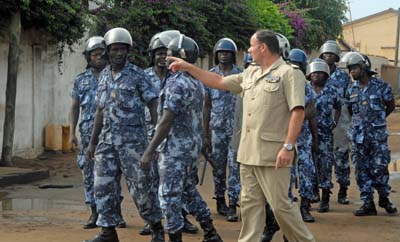On August 10, the private, pro-opposition daily Liberté photojournalist, Ledoux, went on a routine assignment, covering a political demonstration organized by a faction of Togo’s main opposition party. Togolese military police in full riot gear arrived on the scene to violently disperse the gathering. When Ledoux spotted a uniformed French military officer who appeared to be giving orders to riot police, he started taking photos. The officer, later identified as Lt. Colonel Romuald Létondot, stormed toward Ledoux, backed by baton-wielding officers. He ordered the journalist to erase the photos, threatening to smash his camera and commanding Togolese police to “book him.” The whole scene was caught on video.
At some point, Letondot says: “Do you know who I am? I am the adviser to the army chief of staff. Do you want me to call RCGP [Presidential Guard Commando Regiment] to bring this to order? Yes or no?” Earlier, he can be heard on tape saying to the military police officers on the scene: “Throw him into prison.”
Video of the incident, recorded by Togolese journalist and blogger Noël Tadegnon, first appeared on Facebook last Tuesday, where one commenter wrote: “the news spread like wildfire. Thank you for everything. Beyond your job, it was a civic accomplishment.” Then it hit YouTube, where it registered nearly 700,000 views as of today.
The symbolism of the scene–a French officer intimidating a journalist in one of France’s former colonies–struck a nerve in both the Togolese and French press. Editor Pierre Haski wrote on the French online daily Rue 89 that the French officer is both “arrogant” and “threatening” over “an incident that is obviously minor.”
“Fifty years after African independence was celebrated with great pomp this summer on the Champs-Elysées, it is surprising,” Haski wrote.
For Ledoux, who has been working the streets of Lomé since 2001, physical and verbal intimidation from police or bodyguards of officials–in total impunity–has been an accepted peril of the job. Pointing your camera during a demonstration in Lomé can draw trouble here as in Abidjan, Dakar, Kampala, Mogadishu, or Harare.
A reporter at Ledoux’s newspaper asked questions: “What is a special adviser to the army chief of staff doing at a public demonstration whose security is in principle assured by the police and the gendarmerie? Why was he giving orders as the images show?”
Faced with a public relations disaster, the French Embassy in Lomé released a short press statement describing the circumstances: “The vehicle of a French officer, member of the mission of military cooperation, which was fortuitously near a gathering, was today the target of stone throwers. After alerting the acts to a squad of military police which was nearby, the officer did not want a photographer to take photos.” Then the embassy staged a reconciliation meeting during which the officer reportedly apologized to the journalist.
In an interview with French daily L’Express on Thursday, Letondot claimed he had even become “buddies” with Ledoux and said he was motivated by the fear that photos of him talking to Togolese police would be “misinterpreted.” It is a complaint Ledoux has often heard from Togolese security forces, he told me. “They are very allergic to photo-taking because they realize they might be caught in heinous acts in contravention to human rights and they want to protect themselves from possible prosecution.”
Letondot claimed he had been driving in Lome to settles his taxes and administrative paperwork when his vehicle found itself “by chance” near the demonstration. He said he was only talking to riot police to point out to them young men who had thrown stones at his vehicle.
His recollection of what happened next, however, directly contradicts the footage. “I ignored that I was dealing with a journalist of Liberté,” he said. The word “press” can be seen in blue letters on the photojournalist’s sleeveless vest sported by Ledoux throughout the video. Addressing the journalist using the patronizing French pronoun “tu,” Letondot is heard saying: “I don’t care if you’re press. You remove it. You remove your photo now or I take it. Now!” as he grabs the camera hanging from Ledoux’s neck. At some point, Ledoux is even heard saying: “I am covering an event, I am doing my job! It’s as if I was asking you to give me your weapon!”
Letondot went as far as to claim to L’Express that he was the victim in the incident: “I am rather the victim in this case. One must understand that I had no alternative and that I was set up.”
Paris announced last week that Letondot would be recalled. In an earlier statement, French Defense Ministry spokesman Laurent Teisseire told Agence France-Presse that Letondot’s attitude “does not correspond in any way with our values nor our idea of media relations and press freedom.”
Ledoux had something to say about that. He said that for Letondot, who “comes from a democratic country like France, to indulge in such behavior while an advisor to Togo’s army chief, shows that he is setting a bad example for our officers. No military officer could threaten a journalist in France like this.”
